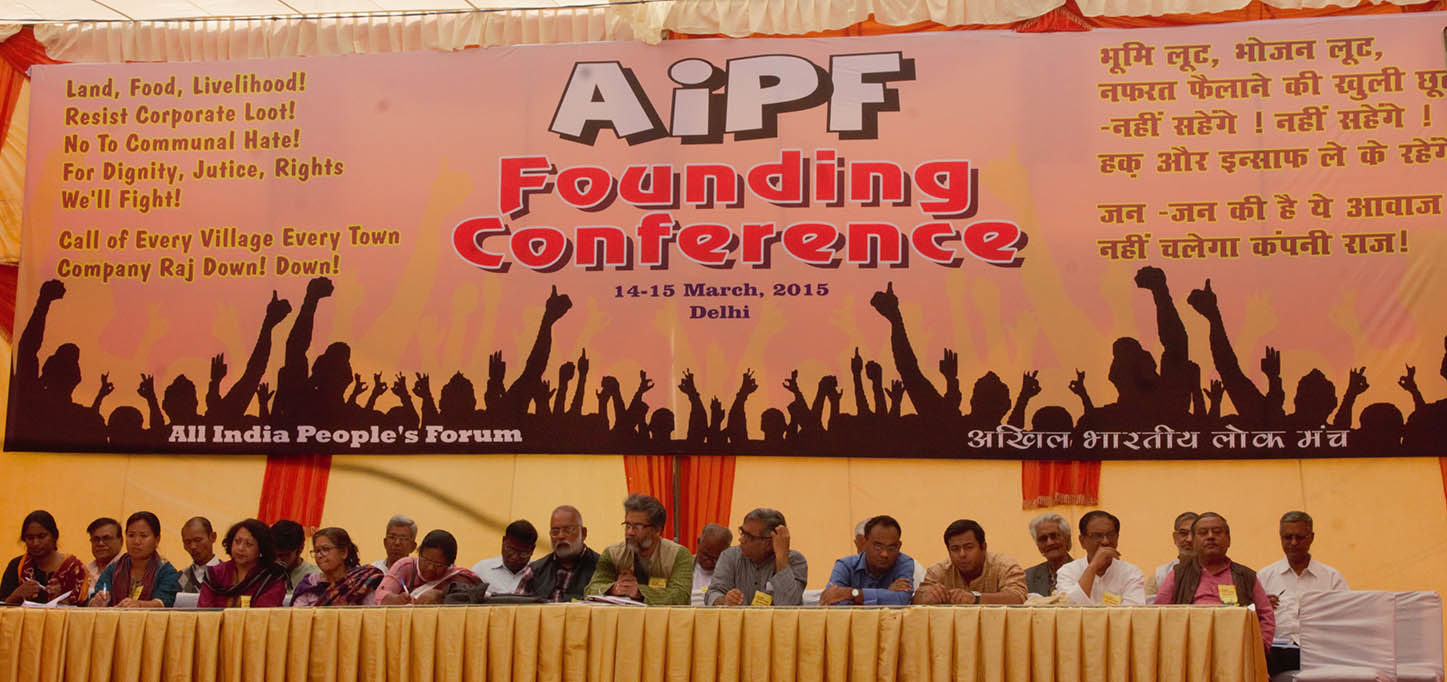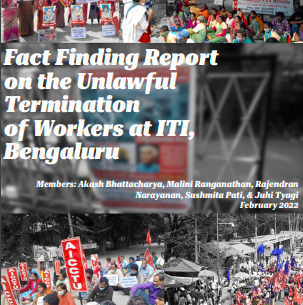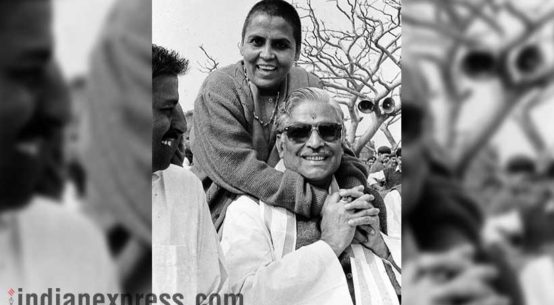
Arange of concerned citizens, mass organizations, social movements, trade unions and political parties have come together to form the All India People’s Forum (AIPF) to take on the offensive of communal and pro-corporate policies.
The Founding Conference of the AIPF began today at Ambedkar Bhawan in Delhi. The Welcome Session of the Conference began with a rousing AIPF theme song by Jan Sanskriti Manch, Jharkhand. This was followed by a tribute the martyrs and departed fighters, (including the Nandigram peasants who were martyred on 14th March 2007), Comrade Govind Pansare, and Comrade Shah Chand. A draft Vision Statement, as well as a draft Action Charter for the AIPF were presented at this session.
Welcoming the participants, Dipankar Bhattacharya, General Secretary, CPI(ML), spoke of the all-out offensive – by both the Congress-UPA and the BJP-NDA – on people’s land, livelihood, right to food, as well as on democratic rights, and the campaign to divide people by communal hatred and violence. To take on this offensive, and to assert people’s rights to land, livelihood, education and healthcare, justice, peace, dignity and freedom, he said, it was important for people to unite and fight together. Together, they would carry forward the fight for a free, equal and just society, free of sectarian violence, repression and discrimination. He said, ‘This is an open convention and we will keep organizing such programs in the future along with new forces and build the widest possible unity.”
The welcome session was also addressed by Vijay Pratap on behalf of the Samajwadi Samagam, who stressed the need for socialist and communist streams as well as all democratic movements to come together to infuse new life into progressive politics. Addressing the welcome session, Gautam Mody of the NTUI said that the AIPF platform was significant in that it unites both progressive political parties as well as non-party organisations. Mangat Ram Pasla, Secretary of CPIM Punjab said that mutual respect for differences was important as we unite for a united resistance to neoliberal and communal policies. Addressing the participants, Binayak Sen explained why he felt the need for AIPF. He said that activists submitted a blueprint of a people’s health programme to the Planning Commission, but the whole plan was relegated to the dustbin by the then Planning Commission chairperson Montek Ahluwalia. He said there was an urgent need for a powerful people’s health movement that would urgently address the critical levels of malnutrition and hunger in the country. On the dais were Swapan Mukherjee, AICCTU, Kavita Krishnan, AIPWA, Dayamani Barla, Manju Mohan (Samajwadi Samagam), RP Pakhrin (CPRM), Prasenjit Bose, Rohit of Left Collective, Uday Bhatt, Lal Nishan Party (Leninist), advocate Md Shoaib of Rihai Manch, Lt. General (Retd) USP Sinha, Tahira Hasan, Pratima Engheepi, veteran Kannada writer Vitappa Gorentli, Comrade Simpson from Tamil Nadu’s Odukapattor Viduthalai Munnani, Faisal Anurag from Jharkhand; Dr. Satinath Choudhury and others.
In the afternoon, activists from all over the country discussed plans for campaigns on a range of issues. Journalist Pankaj Srivastava recited his satirical poem on Modi and communal-corporate politics.
A session on ‘Asserting Right to Land, Livelihood and Food Security: Resisting Land Loot, Food Loot’ was conducted by Rajaram Singh, Secretary of the All India Kisan Mahasabha. The session was addressed by Reetika Khera who spoke about the curtailments in the Food Security Act. She pointed out that the Moi government was further diluting the already weak Food Security Act by massively cutting down the budget of the Midday meal scheme; moreover, attempts are on to completely hand over this scheme to companies and NGOs. Noted economist Jean Dreze pointed out the various ways in which the Central government was systematically diluting and weakening the MNREGA scheme: the scheme has been restricted to just 200 districts across the country, its potential to provide daily employment has been removed, the concept and the very word ‘minimum wages’ has been delinked from the scheme, work has been defined as a ‘duty’ rather than as a fundamental right, the process of accessing jobs under the MNREGA has been made more cumbersome, possession of an Aadhar card has been mandatory to avail of benefits under the scheme, and a ceiling has been placed on the MNREGA’s budget. Roma Malik of AIUFWP, Prasenjit Bose; Faisal Anurag as well as anti displacement activists from Jharkhand and Odisha discussed strategies of resisting the draconian Modi Government’s Land Acquisition Bill. Presenjit Bose stated that the present government was launching an assault on social welfare. Pointing out that the issue of land was connected to democracy, he stated that the people of the country have always decisively rejected and thrown out any government which forcibly snatches away land. Showing that there is no difference in the economic policies of the Congress and the BJP, he said that only a mass peoples’ movement can prevent the opportunist machinations of ruling class parties in the Parliament. Roma Malik said that land was being forcibly snatched away not just through laws, but also through the current administrative apparatus. Faisal Anurag also said that ‘development’ cannot be built on the graves of adivasi society, their cultures and languages. The people of Jharkhand have decided that not even an inch of land suitable for cultivation will be given to the government; out of 108 MoUs signed in the state, 106 have not materialised due to massive people’s resistance. Usha Ramanathan pointed out that there are constitutional provisions protecting adivasis’ rights on land, and now the Government is behaving as it were the owner of the entire country. The Land Acquisition ordinance was being brought in only to facilitate snatching away of lands from adivasis for corporate profits.
A session on Right to Health and Education was conducted by Radhika Menon. Participating in this session, Vikas Gupta of the All India Forum for Right to Education (AIFRTE) gave an inspiring presentation on the discriminatory and multi-layered education system in India and the struggle to replace this with a free common education system in which all would have access to good quality education. He pointed out that the government was constantly belying the trust reposed in it, and washing its hand off its fundamental responsibility for providing education to all. 86% of adivasi children are forced to drop out of school after the 8th standard. Growing commercialisation and profiteering in the education sector has further deprived students from economically and socially underprivileged backgrounds from accessing education. Pointing out that education too is a class question, he stated that the government is creating a situation where quality education is accessible only to the rich and privileged. Health activist Binayak Sen showed through facts and figures that despite all the claims of various governments, chronic hunger, starvation and malnutrition continues to stalk large tracts of rural India. Hunger and malnutrition in turn have had a hugely adverse impact on peoples’ health – for instance the prevalence of tuberculosis has increased by a whopping six times.
Leena Menghaney from the Campaign for Affordable Cancer Medicines spoke of the Modi Government’s moves to appease US drug corporations, in the process risking the health of millions of patients in India and across the world by delaying access to low-cost generic drugs and promoting an anti-people patent regime. Dr Debashis Dutta spoke of the experiences of the People’s Health Forum of West Bengal, and said that if the political will exists, it is indeed possible to put in place a wide-spread community health service. Prof. Salil Vishwas as well as student activists of the AISA Sucheta and Ishan of the DSF also spoke of the struggles against privatization and saffronisation of higher education, and for campus democracy.
In a session on Justice and Dignity of Women, Dalits and Adivasis, noted lawyer and activist Usha Ramanathan said that the Forest Rights Act did not confer rights on forest people, it just affirmed rights that the adivasis already had under the Constitution. In that sense, the Act was an apology from the Indian State to the adivasis. But the Act posed a great challenge to the state and to the corporations who could no longer take forest land for granted. Before the Act, the adivasis lived in fear of the forest authorities; after the Act, it was the State that felt afraid of adivasis’ assertion of their rights. This is why the State has been reluctant to implement the Act in earnest, and there are moves afoot now to dilute or negate this Act. This session was conducted by Kiran Shaheen, and addressed by Rajni Tilak of the Rashtriya Dalit Mahila Andolan, journalist Neha Dixit, Manas Jena, filmmaker Meghnath, Kiran Shaheen of Women Against Sexual Violence and State Repression, Dr Satinath Choudhury; Alka Kujur from Jharkhand; and Meena Tiwari, General Secretary, AIPWA. On the second day of the AIPF founding conference, the morning session started with activist and writer Achin Vanaik dismantling the myths about nuclear energy and explaining why all people’s movements must resist the move to force dangerous and expensive nuclear energy onto India when so many countries in the world are giving it up.
The next session highlighted the communal challenge that the country is facing especially at a time when the Government is openly colluding and collaborating with the Sangh Parivar to further the agenda of hate and divide people on communal lines. The session was addressed by activists and film makers who have consistently stood up to and documented communal violence. These included Nakul Sawhney, Dr. Irfan Engineer from Mumbai, A. Marx from Tamil Nadu, Rehana from riot-hit Muzaffarnagar, Kiran Shaheen who was among the earliest to intervene in the communal violence in Delhi’s Trilokpuri; Vidya Dinker who spoke about the moral policing and communal hate campaigns of the Sangh Parivar in Mangalore; KL Ashok of the Karnataka Kaumi Sauhardra Vedike; Sharfussin Shaikh of the SDPI; and Praveen of Western UP’s Naujawan Bharat Sabha. ID Khajuria, leader of the Internationalist Democratic Party (IDP) from Jammu and Kashmir Afzal Anis of the United Milli Forum, Jharkhand greeted the Conference.
This was followed by a discussion of the various attacks on democratic rights that are happening in the country either with direct or tacit support of the state. The session was conducted by civil libertarian N.D. Pancholi, and participants included Comrade Simpson, Md Iftiqar Alam of Insaaf Manch (Bihar) and Nadeem Khan of Insaaf Manch (Jharkhand), Md Shoaib of Rihai Manch, (UP), Karnail Singh of the IDP; and Chittaranjan Singh of PUCL. The activists discussed the way in which Muslim youth have been illegally arrested across the country in false cases and have been imprisoned without a shred of evidence, and the use of draconian laws as well as draconian provisions in criminal laws to harass and intimidate innocent people and activists. Comrade Simpson from Tamil Nadu highlighted the way in which author Perumal Murugan has been hounded by the Hindu Right. The session in the afternoon saw a number of activists from across the country speaking about the loot of natural resources by the corporates and the assault on workers’ rights in the name of Make in India Campaign. The session was conducted by Rajiv Dimri of AICCTU, and addressed by Prof. Atul Sood from JNU, noted journalist Paranjoy Guha Thakurta, Uday Bhatt of LNP(L), Vidya Bhushan Rawat, Vitappa Gorentli, anti-POSCO PPSS activist Prakash Jena, trade union leader Upendra Singh, and others who spoke of the bending of existing rules and regulations so that corporates smoothly takeover natural resources and violate the rights of workers.
In the final session of the conference the foundation statement of the AIPF was unanimously adopted by the founding conference and a Panel of Advisors, Campaign Committee and All India Council was formed with activists and organisations from all over the country.
The 44-member Panel of Advisors includes Kuldeep Nayyar, Vijay Pratap, Lt General USP Sinha, Xavier Dias, Anand Teltumbde, Anand Patwardhan, Jean Dreze, Achin Vanaik, Vrinda Grover, John Dayal, Manoranjan Mohanty, Bharti S Kumar, and others.
The 57-member Campaign Committee includes SP Udayakumar, Sunilam, Irfan Engineer, Binayak Sen, Manas Jena, Purushottam Roy Burman, Dayamani Barla, Vinod Singh, Manju Mohan, Roma, Kiran Shaheen, Rohit, Amar Singh Amar, ND Pancholi, Mangat Ram Pasla, Vijay Kulkarni, Gobind Chettri, Sudha Bharadwaj, Kumar Sundaram and others. The 120-member All India Council has activists from all over the country.
Following the Conference, a massive Jan Sansad (People’s Parliament) was held on 16th March at Jantar Mantar under the banner of the All India People’s Forum (AIPF), against the loot of land, livelihood, and food by the Modi Government.
The Jan Sansad was addressed by leaders of peasant and adivasi movements and Left and socialist leaders. The Jan Sansad was conducted by Rajaram Singh, General Secretary, All India Kisan Mahasabha, and Member, Campaign Committee, AIPF, and attended and addressed by a range of activists and leaders of parties and people’s movements. Veteran columnist and civil libertarian Kuldeep Nayyar told the gathered people, “Your land is your own, no one can take it from you by force, defend your land with all your might.” Many activists of peasants’ movements and struggles against corporate land grab addressed the gathering, including AIPF All India Council member POSCO Pratirodh Sangram Samiti leader Prakash Jena; Raju Bora, leader of the Krishak Mukti Sangram Samiti of Assam and AIPF Advisor; AIPF Campaign Committee members Sunilam, ex-MLA and leader of the Kisan Sangharsh Samiti; and Dayamani Barla of Jharkhand. In an inspiring speech, Dayamani Barla asserted the rights of people to land, forests, water and political power as well. Sunilam said that people’s movements would triumph over the corporate-funded political forces, since the movements refused to be terrorized by bullets and jails.
AIPF Campaign Committee member Roma Malik, GS of the All India Union of Forest Working People, in her rousing address, spoke of women’s enormous role in all the ongoing people’s movements, and stressed the need for united struggles of peasants, adivasis, and workers.
Addressing the Jan Sansad, Kiran Shaheen said that the AIPF marked a new beginning of united struggles that would usher in a new dawn. She stressed the question of right to water as a fundamental right, as essential as the right to food.
Addressing by Dipankar Bhattacharya, General Secretary, CPI(ML) Liberation pointed out that the Modi Government had promised ‘acche din’ for the people, but had delivered ‘acche din’ only for the corporations and the rich. Social sector spending had been slashed and the Land Acquisition Bill introduced to facilitate the grab of peasant land. Land, livelihood and food security were under attack. And moves were afoot to drastically curtail Food Security Act and MNREGA. He said that massive people’s movements had taught a lesson to arrogant Governments of the Congress as well as regional parties. He called for a new independence movement to oust the Modi Government’s Company Raj. He said that the AIPF was born out of the urge of people’s movements for greater united resistance to the ongoing corporate and communal offensives.
Rameshwar Prasad, ex-MP and President of the All India Association of Agricultural Labourers (AIALA) spoke of the rights of landless labourers and agricultural workers, whose livelihood is lost when land is grabbed. AIPF leaders announced their intention to observe 23rd March, the martyrdom day of Bhagat Singh, Sukhdev and Rajguru, as Bhoomi Adhikar Diwas (Land Rights Day) followed by a 100-day mass campaign on Land Rights and Labour Rights (Bhoomi Adhikar-Shram Adhikar Sangharsh Abhiyan). As part of this campaign, the rights of people to health, nutrition, water and education will also be raised along with the right to land, livelihood and workers’ rights.
People’s health activist and civil libertarian Binayak Sen was also present on the dais. Bhimrao Bansode, General Secretary of the Lal Nishan Party (Leninist) called for people’s resistance to the communal and corporate offensive.
The Jan Sansad was also addressed by AIPF Campaign Committee members Mohd Salim, AIPWA General Secretary Meena Tiwari; Rajendra Bauke of Lal Nishan Party (Leninist); PC Tiwari of the Uttarakhand Parivartan Party.
Also present were AIPF Advisor Lt General USP Sinha; Chittaranjan Singh of PUCL; Dhirendra Jha, General Secretary AIALA; ex-Colonel Laxmeshwar Mishra; and AIPWA Secretary Kavita Krishnan.
The speakers at the Jan Sansad pointed out that the Modi Government had promised ‘acche din’ for the people, but had delivered ‘acche din’ only for the corporations and the rich. Social sector spending had been slashed and the Land Acquisition Bill introduced to facilitate the grab of peasant land. Land, livelihood and food security were under attack. And moves were afoot to drastically curtail Food Security Act and MNREGA. Speakers said that massive people’s movements had taught a lesson to arrogant Governments before including the UPA Government, and the Modi Government’s Company Raj too would be taught a lesson by the people.
A delegation of AIPF leaders and prominent citizens from the Jan Sansad submitted the 1000s of gram sabha resolutions to the President of India, seeking his immediate intervention to protect land, livelihood and food security. The resolutions demanded scrapping of the Land Acquisition Bill, as well as scrapping of moves to dilute and curtail the MNREGA and Food Security Act.


